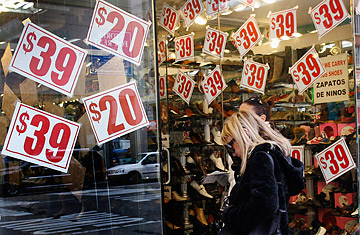
For many consumers, Black Friday, Cyber Monday and the weeks that follow will be a good time to sit on their hands.
Cash-conscious shoppers are hoping to see a repeat of 2008's eye-popping discounts, when markdowns, even on high-end fashion duds, exceeded 75% in the weeks leading up to Christmas. Although retailers are insisting that they won't resort to jaw-dropping discounts this year, what happens will ultimately depend on how much and how quickly they get consumers to start spending. And it won't be easy.
"Being frugal is in, and being lavish is out," says Beth Strobel, director of marketing at PayPal. So shoppers are programmed to wait for huge bargains.
Take Jessica Laux, a 32-year-old mother of two in Pittsburgh, Pa., who shops regularly at Saks and Nordstrom. "I'm hopeful there's going to be similar deals as there were last year — and almost expecting it, given the current state of the economy," says Laux. She remembers 2008's steep holiday discounts and is unimpressed with the paltry 30% markdowns that are currently being offered. "Seeing 30% isn't going to make me shop earlier," says Laux, who adds that she'll do the bulk of her shopping in the final two weeks before Christmas if the markdowns don't come sooner. "I'm not afraid to wait," she says.
Laux is a retailer's worst nightmare, and there are plenty more like her.
A holiday outlook report released on Monday by AlixPartners LP says 88% of consumers plan to spend the same or less on gifts this year than they did in 2008. The survey, which polled about 3,500 people nationwide in early November, found that 60% of consumers plan to spend less on gifts, and 55% say they'll wait for deep discount sales and specials before opening their pocketbooks. More than half say they plan to buy less-expensive merchandise than a year ago, and 52% say they'll give gifts to fewer people. "This is a fundamental shift," says Bryan Eshelman, managing director at AlixPartners LP.
But retailers are digging in their heels, insisting they won't slash prices to 2008 levels. Last year, retailers had loaded up on goods for the holiday season but were then hit with the collapse of Lehman Brothers, upheaval in the credit markets and the AIG crisis, which sent tremors of fear far and wide. Consumer spending dried up, and shoppers abruptly disappeared. Retailers found themselves sitting on huge inventories of unsold goods, and many frantically started chopping prices to clear shelves.
But retailers have planned for this season's frugality, ordering up to 20% less inventory, making them less susceptible to mid-December price-slashing. "You clearly aren't going to see the kind of discounting that you saw last year," says Stephen Sadove, chairman and chief executive of Saks Inc. Wayne Hood, an analyst at BMO Capital Markets, agrees. "We're expecting 50% [markdowns] to be kind of the norm this year vs. maybe 75% last year," he says.
Shoppers who wait too long could be left empty-handed as reduced inventory levels will mean fewer sizes, colors and selections of items. "That baby-blue cashmere sweater in medium may not be there on Dec. 24," says Richard Jaffe, managing director at Stifel Nicolaus & Co.
Still, the deepest discounting will likely come from retailers that sell electronics, books and toys, where competition from online vendors is fierce. Pricing wars have already erupted, with Walmart going head-to-head with Amazon. The two chopped prices on hot new hard-cover releases to less than $10 apiece for shoppers who preordered books on their websites. Similar price battles have been launched in toys and electronics, with Walmart's chief merchandising officer, John Fleming, proclaiming, "We're going to be the price leader for this holiday season." Best Buy's executive vice president of customer operating groups, Mike Vitelli, says his company will match competitors "dollar for dollar."
Retailers know they can't afford to ignore discounting from online retailers. "If they can't get the consumer off of Amazon and into their store, then they'll lose the entire share of wallet, not just the one product that they lost to Amazon," says Rick Smith, author of The Leap and founder of Marketing50.
But discounting can only go so far before it no longer makes financial sense. For this reason, promotions and price discounts will likely be strategically planned, not panic-driven as they were last year, says Howard Davidowitz, chairman of Davidowitz & Associates Inc., a national retail consulting and investment firm.
In the end, it will come down to a game of chicken, in which consumers face off with retailers over price to see who blinks first, says AlixPartners' Eshelman. But with inventories significantly lower, the desperate markdowns may never happen. "Retailers are focused much more on profitability than on sales growth," he says. "So I think retailers have a better chance of winning that game of chicken this year than in years past."
